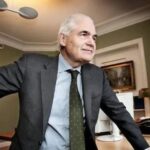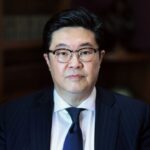- Home
- Billionaires
- Investing Newsletters
- 193CC 1000
- Article Layout 2
- Article Layout 3
- Article Layout 4
- Article Layout 5
- Article Layout 6
- Article Layout 7
- Article Layout 8
- Article Layout 9
- Article Layout 10
- Article Layout 11
- Article Layout 12
- Article Layout 13
- Article Layout 14
- Article Sidebar
- Post Format
- pages
- Archive Layouts
- Post Gallery
- Post Video Background
- Post Review
- Sponsored Post
- Leadership
- Business
- Money
- Small Business
- Innovation
- Shop
Recent Posts
The Life and Legacy of Andrei Guryev and Family

Andrei Guryev, a prominent Russian businessman and former government official, stands as one of the most influential figures in Russia’s economic and industrial spheres. Known primarily for his leadership of PhosAgro, one of the world’s largest producers of phosphate-based fertilizers, Guryev’s career spans both political and corporate domains. His life story, entwined with Russia’s post-Soviet industrial evolution, paints a portrait of calculated ambition, strategic influence, and lasting legacy, both in business and within his family.
Born in 1960 in Lobnya, a town in the Moscow region, Andrei Grigoryevich Guryev’s rise began with his educational foundation at the Plekhanov Russian University of Economics. He further expanded his academic credentials at the University of Physical Culture, which laid the groundwork for his early career in the world of sports and fitness, a background that later gave him a unique approach to leadership and team management. Transitioning into business in the 1990s, Guryev entered the competitive and rapidly shifting Russian market at a time when many state assets were being privatized. This era allowed ambitious and connected individuals to acquire stakes in key industries, and Guryev was among those who seized the moment.
Guryev began working with Mikhail Khodorkovsky’s Menatep Group, a financial-industrial conglomerate. Through this affiliation, he gained access to PhosAgro, which would ultimately become his primary enterprise and the cornerstone of his wealth. In 2004, following Khodorkovsky’s arrest and the state’s seizure of Yukos assets, Guryev acquired control of PhosAgro. His ability to navigate this turbulent period in Russian business history highlighted his strategic acumen and strong connections, particularly within state structures.
PhosAgro’s transformation under Guryev’s leadership was marked by modernization, expanded production, and international outreach. He successfully turned it into a global player, listed on the London Stock Exchange and recognized for its high-quality, environmentally friendly fertilizers. Guryev’s vision centered around sustainability and feeding the growing global population, aligning PhosAgro’s goals with broader humanitarian and ecological themes, which won the company praise beyond Russia’s borders.
While establishing himself as a corporate titan, Guryev also held a seat in the Federation Council, the upper house of Russia’s parliament, from 2001 to 2013. Representing the Murmansk region, he used his influence to support regional development and economic reform, though critics occasionally questioned the overlap between his business and political interests. Still, his dual roles gave him unparalleled leverage, helping him secure advantageous regulatory conditions for PhosAgro and expanding his sphere of influence within Russia’s elite.
The Guryev family, often described as one of Russia’s wealthiest, has maintained a relatively low profile, in contrast to some of the country’s more flamboyant oligarchs. Andrei’s son, Andrey Andreevich Guryev, has followed in his father’s footsteps and now plays a significant role in the family business, serving as the CEO of PhosAgro. The transition of leadership illustrates a deliberate and strategic grooming process, preserving the family’s wealth and influence across generations. Under the younger Guryev’s guidance, PhosAgro continues its global expansion, signaling a continuity of the father’s legacy.
Despite being based in Russia, the Guryev family has significant international holdings. In recent years, the family gained widespread attention in the United Kingdom for owning Witanhurst, the second-largest residential estate in London after Buckingham Palace. This opulent mansion, purchased through offshore companies, underscores the global footprint and financial capacity of the family. The property has symbolized the blend of wealth and discretion that typifies the Guryev dynasty.
Andrei Guryev has largely avoided the flamboyance and public drama that has characterized the lives of many Russian billionaires. His public image is more reserved, aligned with the persona of a disciplined executive and a strategic operator behind the scenes. Nevertheless, this discretion has not shielded him entirely from scrutiny. Amid rising geopolitical tensions and sanctions imposed on Russian elites in connection with the conflict in Ukraine, Guryev found himself subject to Western sanctions. These measures aimed to pressure Russia’s economic elite, and while Guryev’s direct political activity has diminished, his wealth and international ties have made him a target of foreign policy strategies.
Still, Guryev remains an influential figure. His ability to retain control over a vital industrial asset while navigating legal, political, and economic minefields is a testament to his capabilities. His philanthropic interests, though less publicized, have included support for sports and educational initiatives, particularly in the regions connected with PhosAgro’s operations. These contributions reflect an understanding of corporate social responsibility, a theme increasingly important to Russian corporations aiming for global legitimacy.
The Guryev family, though under increasing scrutiny, appears committed to maintaining its legacy and adapting to new global realities. Their efforts to uphold and expand PhosAgro’s role in global agriculture suggest a long-term vision that extends beyond Russian borders. The interplay between legacy, responsibility, and strategic influence continues to define their position both domestically and abroad.
In summation, Andrei Guryev represents a distinct archetype among Russia’s post-Soviet elite—a calculated industrialist who leveraged political connections, economic foresight, and family stewardship to build and protect a business empire. His legacy, now stewarded by the next generation, reflects the complexities of modern Russian capitalism and the global reach of those who helped shape it. The story of the Guryev family is far from over; it remains a case study in wealth, transition, and the enduring pursuit of influence across borders and generations.
- Andrei Guryev
- Andrey Andreevich Guryev
- billionaire families
- business empires
- Corporate governance
- corporate succession
- discreet wealth
- economic influence
- elite families
- Family Business
- fertilizer industry
- fertilizer market
- fertilizer production
- Generational Wealth
- global agriculture
- Global Business
- global trade
- Guryev family
- industrial tycoons
- International Business
- legacy wealth
- London mansions
- Menatep Group
- Mikhail Khodorkovsky
- mineral production
- offshore holdings
- oligarch lifestyle
- philanthropy in Russia
- PhosAgro
- phosphate fertilizers
- political business ties
- post-Soviet economy
- Russian billionaires
- Russian business elite
- Russian CEOs
- Russian corporate power
- Russian economy
- Russian enterprises
- Russian entrepreneurs
- Russian executives
- Russian Federation Council
- Russian oligarchs
- Russian politics
- Russian sanctions
- silent billionaires
- Strategic Leadership
- sustainable agriculture
- UK sanctions
- Witanhurst London
- Yukos
Recent Posts
Categories
- 193 Countries Consortium Partner1
- 193cc Digital Assets2
- 5G1
- Aerospace & Defense48
- AI37
- Arts3
- Banking & Insurance11
- Big Data3
- Billionaires1,506
- Boats & Planes1
- Business332
- Careers13
- Cars & Bikes79
- CEO Network1
- CFO Network17
- CHRO Network1
- CIO Network1
- Cloud10
- CMO Network18
- Commercial Real Estate7
- Consultant1
- Consumer Tech194
- CxO1
- Cybersecurity73
- Dining1
- Diversity, Equity & Inclusion4
- Education7
- Energy8
- Enterprise Tech29
- Events11
- Fintech1
- Food & Drink2
- Franchises1
- Freelance1
- Future Of Work2
- Games149
- GIG1
- Healthcare79
- Hollywood & Entertainment203
- Houses1
- India’s 1000 Richest1
- Innovation46
- Investing2
- Investing Newsletters4
- Leadership65
- Lifestyle11
- Manufacturing1
- Markets20
- Media327
- Mobile phone1
- Money13
- Personal Finance2
- Policy569
- Real Estate1
- Research6
- Retail1
- Retirement1
- Small Business1
- SportsMoney42
- Style & Beauty1
- Success Income1
- Taxes2
- Travel10
- Uncategorized15
- Vices1
- Watches & Jewelry2
- world's billionaires1,475
- Worlds Richest Self-Made Women2
Related Articles
Francis Choi: The Toy Tycoon Behind a Billion-Dollar Empire
Francis Choi Chee-ming, often referred to as Hong Kong’s “King of Toys,”...
By 193cc World's BillionairesJune 6, 2025Francine von Finck and the Legacy of a Discreet Fortune
Francine von Finck, a name that commands respect in elite business circles,...
By 193cc World's BillionairesJune 6, 2025The Life and Legacy of Stefano Pessina
Stefano Pessina, one of the most influential figures in the global pharmaceutical...
By 193cc World's BillionairesJune 6, 2025John Morris: A Life of Vision, Growth, and Legacy
John Morris, the founder of Bass Pro Shops, is an iconic figure...
By 193cc World's BillionairesJune 6, 2025















Leave a comment